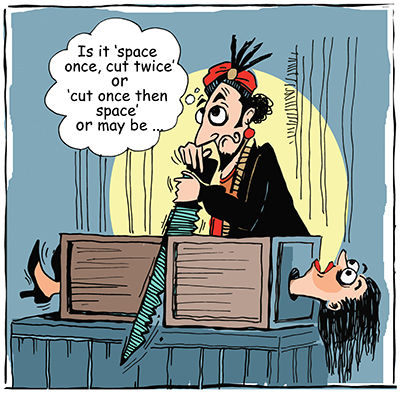The magician
Berjis Desai
Sim Salabi, phoo phoo,” he hissed, and some white pigeons fluttered out of an empty box. Dressed in an Arab robe and sporting a French goatee, the magician then summoned a buxom assistant wearing a short sleeved gown from which emerged dozens of colored handkerchiefs tied together, and at the very end, a black bra; which led to peals of laughter. He chopped a few carrots with a deadly looking mini guillotine. With great fanfare, he hushed the audience into silence, as a young lady’s hand replaced the carrots. As the shiny knife was about to be released, the audience gasped, and was then relieved, when the lady’s hand emerged unscathed. The show ended with the much trumpeted Asrah levitation, when he hypnotised the buxom assistant whose body levitated, and then slowly floated away into thin air, only to reappear in the audience.
After finishing the show, he rushed backstage, let off a barrage of profanities at one sheepish assistant who had forgotten to place the rabbits into the right compartment, puffed on his pipe; drank three cups of insipid black tea, and rushed to attend the rehearsal of Behram ni Sasoo, a hit Parsi play. As usual, he forgot his dialog despite prompting by his co-actors. The legendary director did not appear too concerned as he knew that the magician, as they all called him, would ad lib (improvise on the stage) and the audience would not be the wiser. In one scene, he had to console his wife who had narrowly escaped being run over by a truck. He forgot his words and in an unintended double entendre, said, "Darling, arré! aajé tu konni lorry niché aavi gai!” He acted in countless comedies but always as a supporting actor.

Illustration by Farzana Cooper
His bad memory resulted in failing his SSC (secondary school certificate) exam twice, but his smartness ensured that he landed a life long job with a mega Parsi industrial group. In the ’50s and ’60s, qualifications hardly mattered and he rose rapidly from a lowly clerk to retire as the Chief Labor Officer of the organization which had a history of violent industrial relations. Trouble shooter, fixer, fast talking loyalist he always somehow managed to pull his employers out of trouble. So much was he trusted and loved by the owner family that he even tied the kusti on the body of the patriarch at Doongerwadi. The staff loved him too, for organizing great picnics, rib tickling comedies at annual day functions, and of course, the magic show.
Born in a cramped house in one of the rickety buildings of Fort, which he had to share with many siblings, he self taught English, enough to conduct magic shows and converse with lawyers who specialized in labor laws. A regular at the Mahalaxmi race course (where, like all punters, he consistently lost money), he loved his tobacco, his whiskey and his women. Married young to an older woman who remained childless, he regaled his many co-actresses and magic show assistants and office subordinates (at all levels). Even his wife’s colleagues and friends were fair game. All done with elan and style and flair. Nationality, religion, economic strata, caste or community was no bar. The philandering was both egalitarian and secular. In his large, rented flat in a building facing the Chowpatty beach (which shook every five minutes whenever a suburban train passed in its backyard), he was more than hospitable to two American school teachers in India, under some cultural exchange program, who were his so-called paying guests.
The rear balcony was packed with cages containing rabbits and white pigeons, and occasionally white mice, for the magic show. Early morning, he drove to work to a distant suburb, in his secondhand Fiat 1100 Delight. He returned home only to relentlessly work with carpenters to prepare contraptions like the mini guillotine and the invisible wires for the illusions he created on stage. At night, he rushed to play rehearsals, frantically tried to pick winners from the ‘Cole’ Race Card for Sunday’s races, though he knew nothing about pedigree or form or handicapping. Interspersed in this hectic schedule were efforts to keep his many lady friends simultaneously happy, without unduly upsetting the wife. Much more difficult than conjuring rabbits and pigeons from nowhere. An ordained priest, he earned pocket money by praying as a part-time priest during the then 18 days of muktad.
Widowed suddenly in his mid-fifties, he immersed himself in Freemasonry (in a lodge where most members were Parsis), which enabled him to travel both in India and abroad. Genial and easy going, he relished the camaraderie of the ‘handa (uncouth) brigade.’ His household was efficiently managed, in his absence by a young, childless widow from a famine stricken area of Maharashtra. She was honest, she was affectionate, she was caring, she was a great cook; and she spoke little. Neither the old magician nor the domestic had anybody they could call their own.
His chain smoking began to weaken his old lungs, as senility crept in steadfastly. His finances began to deteriorate faster than his health. Cheap whiskey replaced Scotch, and finally, half a glass of Corex syrup, instead of the whiskey, to lull him into coughless oblivion. His only worry was what would happen to his faithful servant after his demise. He even gently toyed with the idea of matrimony, but lost his nerve. He bequeathed to her a large part of his remaining money, leaving his many nephews and nieces fuming. He could not help it. He also had to provide for two of his faithful girlfriends. All of whom had given him so much joy. After all, what was happiness? You said, "Sim Salabi phoo phoo,” and your problems vanished into thin air.
Berjis M. Desai is a lawyer in private practice and a part-time writer. He considers himself an unsuccessful community activist.
